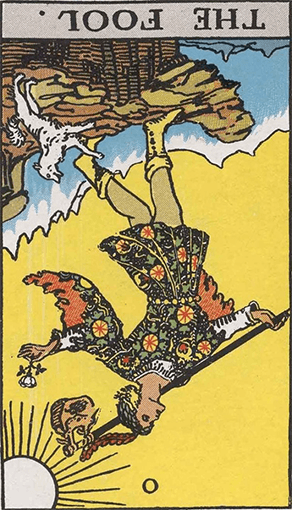The Fool Reversed Tarot Card represents a complex tapestry of meanings when analyzed through a Christian lens. In the diverse kaleidoscope of Tarot interpretation, the reversed position of The Fool signals discord, caution, and introspection, juxtaposed against the backdrop of traditional Christian values. The multi-faceted interpretations of this card provide rich contemplative opportunities for believers and seekers alike.
At its core, The Fool symbolizes new beginnings, spontaneity, and the carefree spirit inherent in embarking on life’s journey. However, in its reversed state, this card beckons individuals to examine their choices through the prism of faith and morality. It serves as a poignant reminder of the pitfalls that await when one veers from the path of righteousness.
One way to explore the meaning of The Fool Reversed is by evaluating the concept of naivety. In the Christian context, blind faith can lead to perilous situations—a theme echoed in scripture. The Fool, when reversed, resonates with instances of misguided adventures, reminding believers to employ discernment. This theme mirrors Moses in the wilderness, where rash decisions led to dire consequences. Such narratives encourage a reflective approach to adventuring into the unknown realms of life.
Another significant facet is the fear of the unknown. The reversed Fool heralds apprehensions that may stem from a lack of faith. In Christian teachings, anxiety and doubt can often inhibit one’s spiritual journey, creating barriers to divine trust. Just as Peter faltered on the waves out of fear, so too does The Fool Reversed admonish believers to confront their uncertainties with courage rather than retreat into complacency. This reflection on fear prompts deliberation on the balance between faith and prudence.
Additionally, The Fool Reversed brings attention to irresponsibility and a disregard for consequences. Christians often grapple with the principle of stewardship. This card’s reversal can manifest as a call to recognize one’s responsibilities—both to oneself and to the community. In times of perceived abandon, believers are urged to assess how their actions resonate within the broader context of God’s expectations. Unchecked freedom could lead to a spiral of chaos; hence, accountability becomes essential in navigating life’s complexities.
As one delves deeper, another layer unfolds with the idea of stagnation or lack of progress in personal growth. The Fool Reversed can signify a reluctance to embrace change or transformation—a pivotal aspect of Christian doctrine. Through the parables, believers are encouraged to step beyond their comfort zones and pursue spiritual evolution. For instance, the story of the Prodigal Son emphasizes the eventual return to growth after facing the consequences of reckless living. Such narratives serve to reinforce the notion that even when complacency prevails, redemption and rebirth are achievable.
Moreover, The Fool Reversed also addresses themes of recklessness in decision-making. Christians may interpret this as a caution against sin or behaviors that stray from the teachings of Jesus. Reflecting on character choices, believers can use the reversed Fool as a lens to scrutinize their decisions. The biblical figure of King Solomon embodies wisdom, cautioning against folly. Similar wisdom urges individuals to engage in mindful contemplation before undertaking significant life changes, thereby aligning more closely with Christian moral teachings.
A traditional Christian perspective also elucidates on missed opportunities that accompany The Fool Reversed. The potential for new beginnings becomes overshadowed by fear or refusal to act. In this context, the card serves as both a warning and a guide. Failing to embrace God’s call to adventure leads to spiritual stagnation. The parable of the Talents illustrates the burdens of inaction and fear of loss as servants were called to multiply their gifts. The Fool Reversed encapsulates the essence of not falling prey to self-doubt or societal pressures but rather following God’s direction fearlessly.
Furthermore, this card invites dialogue about accountability in relationships. The Fool Reversed may indicate impulsivity that undermines spiritual and interpersonal bonds. When recklessness infiltrates a relationship, trust can fray. The Christian ethos emphasizes the importance of cultivating supportive, faith-driven connections. The teachings of Christ echo the significance of love, grace, and understanding within communal ties. Thus, this card serves as a reminder of the blessings of connection and the consequences of impulsive behavior that can breed discord.
Concluding this exploration yields significant insights for the faithful. The Fool Reversed becomes an emblem of introspection, urging believers to reflect on their lives, choices, and spiritual journeys. It implores them to engage actively in God’s narrative, shunning complacency and naivety. More than a cautionary tale, this card serves as an invitation for transformation—challenging believers to strive for wisdom, growth, and deeper connections with the Divine and one another.
Ultimately, navigating The Fool Reversed through a Christian perspective fosters a rich tapestry of understanding, promoting a nurturing journey that values discernment, responsibility, and faith-filled courage. By heeding its wisdom, believers are empowered to stride forward in their spiritual evolution with fervor and purpose.







Leave a Comment